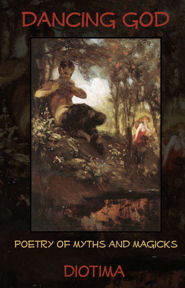
Poetry usually isn’t my preferred reading material, but every so often I find a book of it that I truly enjoy. Dancing God is the second volume of poetry that’s caught my attention in such a way, the first being The Phillupic Hymns by P. Sufenas Virius Lupus. In this particular text, I was treated to a lovely variety of verses, some of which are strongly flavored by mythology–but all of which speak to the human condition.
Diotima’s verses are generally not long, but instead are bite-sized descriptions of her interaction with the world, Divine and mortal alike. There are four themes, each with its own section: Gods, Myths and Sagas; Love; Life; and Death. Diotima has done a lovely job of sorting her works into these categories, but the variety she displays demonstrates an understanding of multiple perspectives on each theme.
The poems in the Gods, Myths and Sagas section may be of particular interest to pagan readers. Her works encompass several mythologies, from Greek to Celtic to Japanese; primarily, though not exclusively, they are snippets of story or honor (or both!) offered to a particular deity. Some are rooted in the deities’ contemporary cultures, such as a rather macabre description of Dionysus’ darker aspects, a retelling of Fenris’ chaining, and a poem to Hekate as “lady of the hounds”. Others, such as Icarus’ musing on human’s common flight in airplanes, a poem comparing the original manifestation of angels to their modern “cute” depictions, and wondering “Do the old gods walk the streets of London?”, are more modern commentary. They all weave together well, and demonstrate that the gods are not, in fact, dead at all. These would all make lovely incorporations into private rituals and meditations.
All of the poems, however, are exquisitely crafted. Both the kind and the painful sides of love are evoked (I was particularly fond of “Communication”, with its recurring line “Damn you, pick up the phone!”). “Life” is a short section full of little slices thereof, commentary on the day to day (and yet how unusual it can be from this angle!). The theme of death is dealt with using everything from grief to black humor, a good catharsis for working through loss.
Having been assaulted with bad verse and worse attempts, Dancing God is a reminder that we still have muse-touched poets today, those who create beauty through carefully structured words. There’s magic in these pages, and Diotima is an accomplished magician when it comes to evoking the feelings she wishes to convey.
~review by Lupa
Author: Diotima
Bibliotheca Alexandrina, 2008
pp. 200
